Diaspora
Stories from diaspora// Alexandrina Robu-Cepoi: “Be the change you want to see in the world and don’t hesitate to act immediately!”
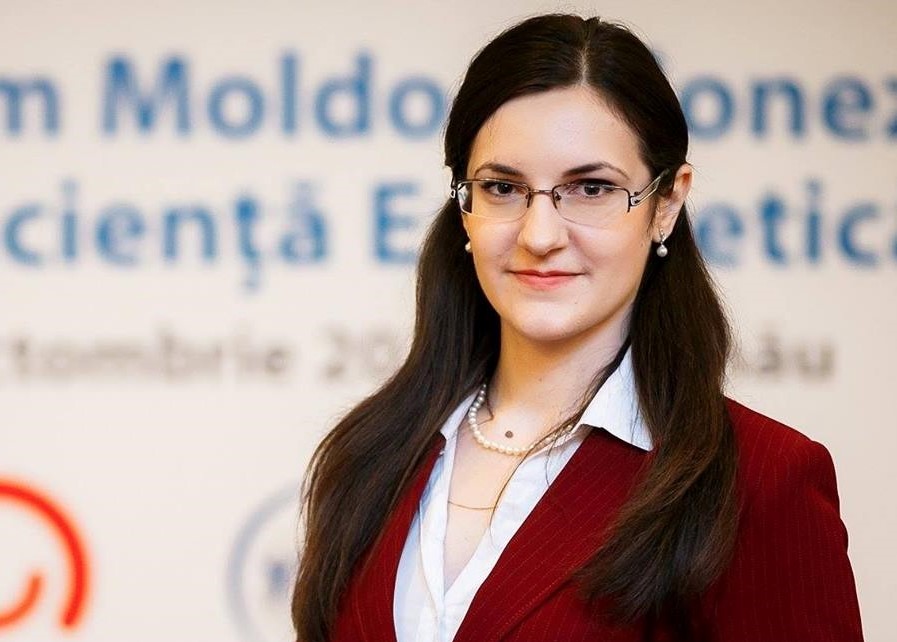
Since she was a teenager, Alexandrina has been involved in various social, educational, economic and cultural projects. She is currently working in Brussels as a Board Member and the Chair of the Women Committee within JEUNE – the Young Entrepreneurs Organization of the European Union, while writing her PhD thesis. Alexandrina Robu-Cepoi is the next protagonist of the “Stories from diaspora” series.
About opportunities
Alexandrina thinks that every person can achieve anything by being perseverant, ambitious, determined and by making the necessary effort for that. “Each of us has thousands of opportunities in his life. The difference is in the ability to recognize them and to fully exploit them.” Alexandrina is the person who seizes the opportunities and turns them into reality.
“When the opportunities are bigger than what I think I can cope with, I get out of my comfort zone and become better. Many of these lessons I learned during the one-year exchange I did in Brazil.”
When she was just 17 years old, Alexandrina won a scholarship for studying in Brazil – a totally new country for her, as she had zero knowledge regarding its culture or language at that moment. Still, she managed to quickly familiarize herself with the new environment and made a lot of friends there. “I learned to be flexible. This ability always helped me,” says Alexandrina.
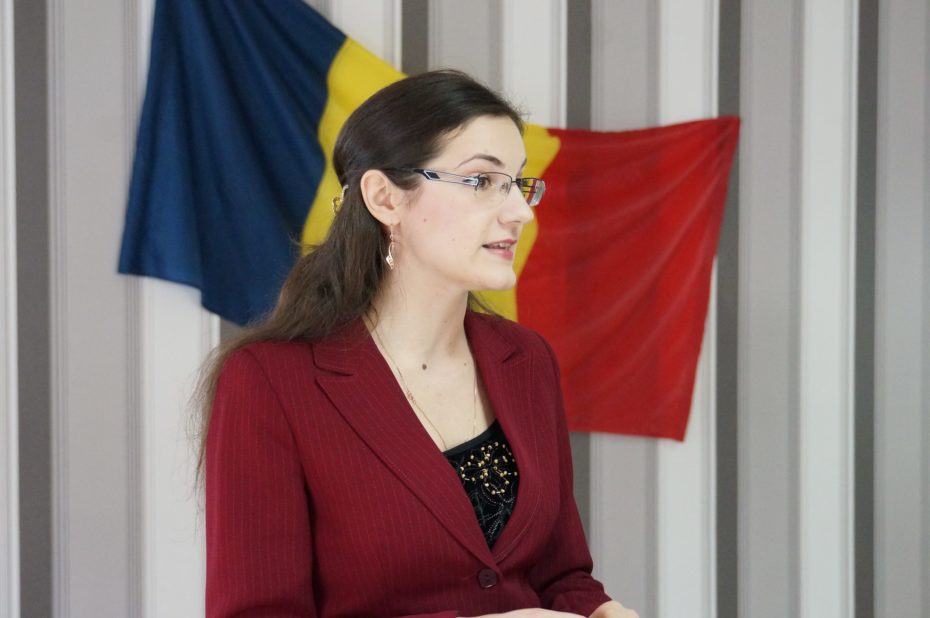
About her life ‘momentum’
Our protagonist is passioned about the energy sector, international policies and entrepreneurship. In fact, she managed to perfectly blend them together through her activity. “My passion for the energy field has materialized five years ago when I became the executive manager of the Employers Association in the Energy Center of the Republic of Moldova. It began, though, during my flight to Brazil when I met an energy expert who told me with great passion about his field of activity. It was the moment when I realized I was interested in working in this sector.”

Alexandrina already had several jobs in Brussels and all of them were related to energy, international politics and entrepreneurship, as she was working in lobbying associations. “The latest project I was involved in along with my colleagues from Central Europe Energy Partners is the Central Europe Energy Day. There, the Vice-President of the European Commission, Members of the European Parliament, representatives of companies from the energy sector and other interested persons were present. This kind of projects have a great impact on EU policies and will be also organized in the future,” proudly claims Alexandrina.
In her spare time, she likes to travel. The last country she visited was Thailand. “I really love to discover new cultures, traditions, places and people. Traveling helps me find myself, express my feelings and fill my soul with positive energy. Thailand really impressed me with its landscape, culinary traditions and its vast culture. I would like to visit all the continents until the end of my life.”

About crucial decisions
Alexandrina is belonging to the category of young people who make changes, not just wait for them. In the past, Alexandrina was the President of the Rotaract Club from Chișinău. Afterwards, she earned a scholarship for studying at the College of Europe in Natolin for one year. Besides her studies, she was again involved in various projects, including the establishment of the Rotaract Club in Poland.
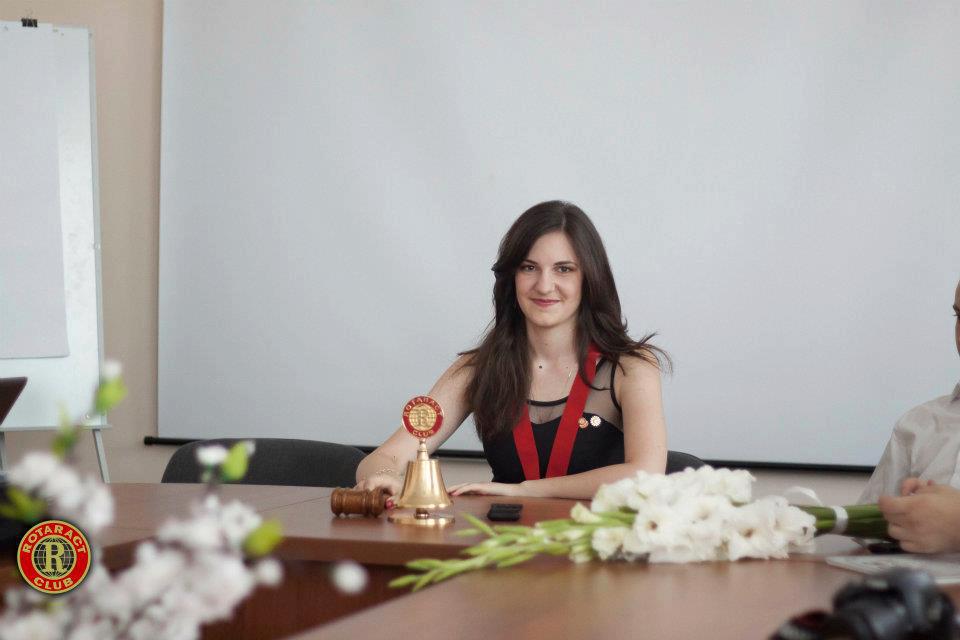
“I had a great experience at the College of Europe. It was a very intense year, with many challenges and successes as well. I gave priority to studies but I also interacted with young people from 32 countries, I made very good friends, I was introduced to new cultures and had the chance to present my culture.” The College is famous for its strict and busy program.
“It is like a Spartan battle where the most powerful and well-organized people win. It is a lifetime experience.”
Still, the decision to study at the College of Europe in Natolin came to a cost. Alexandrina had to take a hard decision regarding her future actions. “The news that I was accepted at the College of Europe came right after I was hired for the position of assistant and non-key energy expert at the EU High Level Advisory Mission to the Republic of Moldova. It was a difficult decision. I asked for advice from several people, including the college graduates. I was advised to choose the studies and I am really grateful for that. The College of Europe was the ‘business card’ for my future experience in Brussels,” recalls Alexandrina.
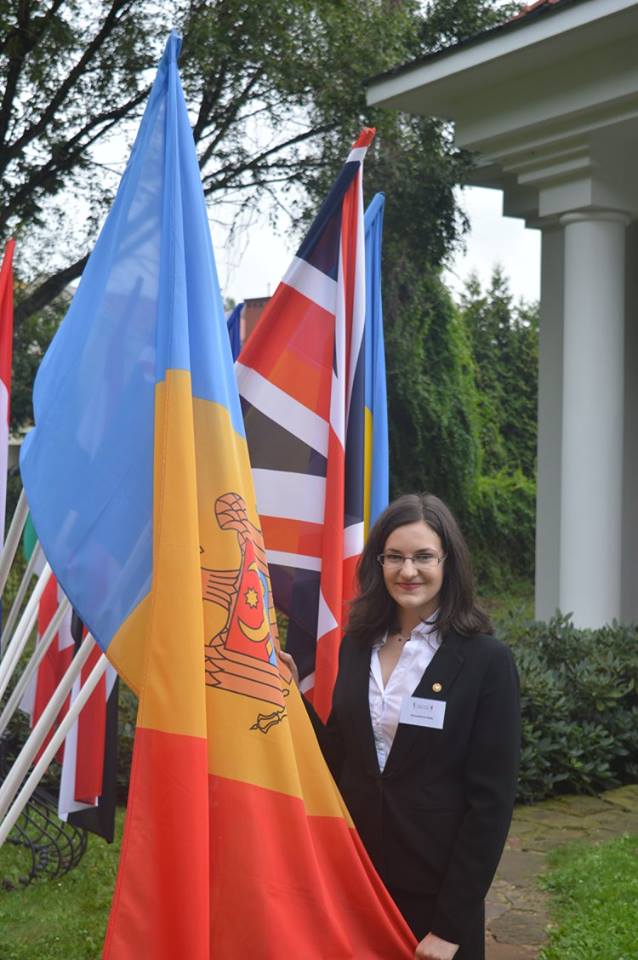
About JEUNE
Currently, Alexandrina is managing the Women Committee of the EU Young Entrepreneurs Organization JEUNE, which is one of the largest profile organisations with more than one million members in the EU and neighbouring countries.
When talking about the path to reaching such a position, Alexandrina mentioned that she first had became a member of the JEUNE Organization and after 4 year of hard work she was entrusted with the Chair of the Women Committee mandate. “I was the President of the European Association of Young Entrepreneurs from Moldova, established under the patronage of the EU Delegation in Moldova, when I filed an application for joining JEUNE. Later I became a member of the Board of Directors and the Chair of the Women Committee, as from this position I could support more the young female entrepreneurs and help them make their voice heard in the European Institutions.”

About ‘changing the world’ home
Alexandrina comes home as often as she can to see her family, to observe the changes that occurred while she was absent and to eat her favourite homemade chicken soup. “Our origins are the places where we were born, where we find spiritual balance. For me, they are the places where I grew up – the house of my parents and my grandparents. Our roots are also represented by the wonderful people who served as a role model and have transmitted their values to us. So that in the good and bad moments, the family is what makes us rediscover our capacities and believe we can overcome any obstacle,” she says.

Alexandrina always talks about Moldova and tries to present it in the best light.
“Now we have hard times, but the political situation can’t ruin the country’s incomparable and wild beauty.”
When comparing the people from western and eastern Europe, Alexandrina believes that “sometimes, westerners are more favoured but we, easterners, are fighters, having a lot of courage.” She says that there is a big difference in mentality between Easterners and Westerners: from the way they treat their jobs to the way they trust politicians. But in the same time, “both sides have their pluses and minuses.”
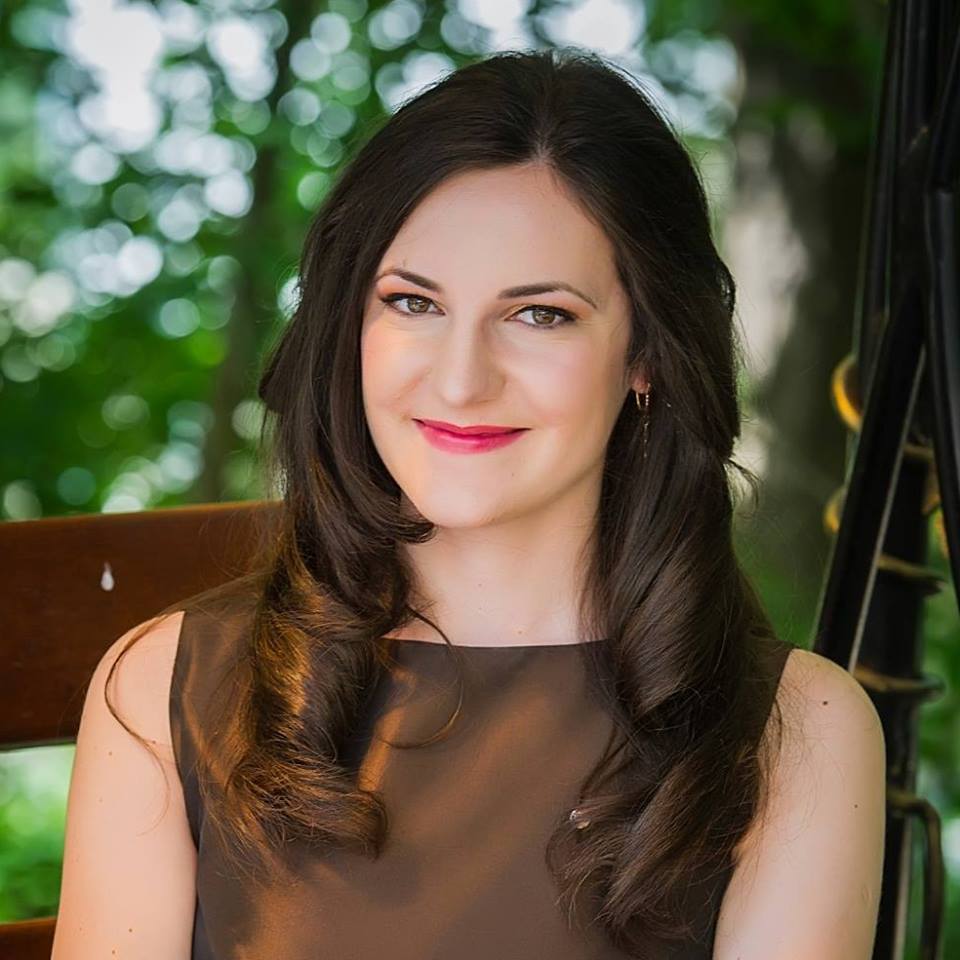
Furthermore, Alexandrina thinks that each Moldovan citizen can make a change. “I am sure that each of us, whether living in Moldova or in diaspora, can change things for the better in our country. I’m trying to implement at least one project per year in Moldova. Even if it’s very hard to manage it remotely, I’m making this effort because I care about my country and I want to contribute to its modernization.”
Alexandrina thinks that it’s not easy to change the people’s mentality, “but if you inform them correctly and show them examples of how to do things in a more efficient way, perhaps they would make the right choices themselves next time.” Alexandrina provides her own example of how to change the people’s mentality: “The last project we implemented in Moldova was the Diaspora Business Academy for young female entrepreneurs where we talked to 30 young women about the best managerial practices. We have also tried to foster economic relations between Moldovan and foreign entrepreneurs.”

Alexandrina is a great dreamer and an optimistic person. She always sees the light at the end of the tunnel and tries to guide others to it as well. Even though she talks less about her goals and dreams publicly, she plans to come back home and contribute to the development of her homeland.
Photos: Facebook| personal profile
Society
“They are not needy, but they need help”. How Moldovan volunteers try to create a safe environment for the Ukrainian refugees

At the Government’s ground floor, the phones ring constantly, the laptop screens never reach standby. In one corner of the room there is a logistics planning meeting, someone has a call on Zoom with partners and donors, someone else finally managed to take a cookie and make some coffee. Everyone is exhausted and have sleepy red eyes, but the volunteers still have a lot of energy and dedication to help in creating a safe place for the Ukrainian refugees.
“It’s like a continuous bustle just so you won’t read the news. You get home sometimes and you don’t have time for news, and that somehow helps. It’s a kind of solidarity and mutual support,” says Vlada Ciobanu, volunteer responsible for communication and fundraising.
The volunteers group was formed from the very first day of war. A Facebook page was created, where all types of messages immediately started to flow: “I offer accommodation”, “I want to help”, “I want to get involved”, “Where can I bring the products?”, “I have a car and I can go to the customs”. Soon, the authorities also started asking for volunteers’ support. Now they all work together, coordinate activities and try to find solutions to the most difficult problems.
Is accommodation needed for 10, 200 or 800 people? Do you need transportation to the customs? Does anyone want to deliver 3 tons of apples and does not know where? Do you need medicine or mobile toilets? All these questions require prompt answers and actions. Blankets, sheets, diapers, hygiene products, food, clothes – people bring everything, and someone needs to quickly find ways of delivering them to those who need them.
Sometimes this collaboration is difficult, involves a lot of bureaucracy, and it can be difficult to get answers on time. “Republic of Moldova has never faced such a large influx of refugees and, probably because nobody thought this could happen, a mechanism of this kind of crisis has not been developed. Due to the absence of such a mechanism that the state should have created, we, the volunteers, intervened and tried to help in a practical way for the spontaneous and on the sport solutions of the problems,” mentions Ecaterina Luțișina, volunteer responsible for the refugees’ accommodation.
Ana Maria Popa, one of the founders of the group “Help Ukrainians in Moldova/SOS Українці Молдовa” says that the toughest thing is to find time and have a clear mind in managing different procedures, although things still happen somehow naturally. Everyone is ready to intervene and help, to take on more responsibilities and to act immediately when needed. The biggest challenges arise when it is necessary to accommodate large families, people with special needs, for which alternative solutions must be identified.
Goods and donations
The volunteers try to cope with the high flow of requests for both accommodation and products of all kinds. “It came to me as a shock and a panic when I found out that both mothers who are now in Ukraine, as well as those who found refuge in our country are losing their milk because of stress. We are trying to fill an enormous need for milk powder, for which the demand is high and the stocks are decreasing”, says Steliana, the volunteer responsible for the distribution of goods from the donation centers.
Several centers have been set up to collect donations in all regions of Chisinau, and volunteers are redirecting the goods to where the refugees are. A system for processing and monitoring donations has already been established, while the volunteer drivers take over the order only according to a unique code.
Volunteers from the collection centers also do the inventory – the donated goods and the distributed goods. The rest is transported to Vatra deposit, from where it is distributed to the placement centers where more than 50 refugees are housed.
When they want to donate goods, but they don’t know what would be needed, people are urged to put themselves in the position of refugees and ask themselves what would they need most if they wake up overnight and have to hurriedly pack their bags and run away. Steliana wants to emphasise that “these people are not needy, but these people need help. They did not choose to end up in this situation.”
Furthermore, the volunteer Cristina Sîrbu seeks to identify producers and negotiate prices for products needed by refugees, thus mediating the procurement process for NGOs with which she collaborates, such as Caritas, World Children’s Fund, Polish Solidarity Fund, Lifting hands, Peace Corps and others.
One of the challenges she is facing now is the identifying a mattress manufacturer in the West, because the Moldovan mattress manufacturer that has been helping so far no longer has polyurethane, a raw material usually imported from Russia and Ukraine.
Cristina also needs to find solutions for the needs of the volunteer groups – phones, laptops, gsm connection and internet for a good carrying out of activities.
Hate messages
The most difficult thing for the communication team is to manage the hate messages on the social networks, which started to appear more often. “Even if there is some sort of dissatisfaction from the Ukrainian refugees and those who offer help, we live now in a very diverse society, there are different kind of people, and we act very differently under stress,” said Vlada Ciobanu.
Translation by Cătălina Bîrsanu
Featured
FC Sheriff Tiraspol victory: can national pride go hand in hand with political separatism?

A new football club has earned a leading place in the UEFA Champions League groups and starred in the headlines of worldwide football news yesterday. The Football Club Sheriff Tiraspol claimed a win with the score 2-1 against Real Madrid on the Santiago Bernabeu Stadium in Madrid. That made Sheriff Tiraspol the leader in Group D of the Champions League, including the football club in the groups of the most important European interclub competition for the first time ever.
International media outlets called it a miracle, a shock and a historic event, while strongly emphasizing the origin of the team and the existing political conflict between the two banks of the Dniester. “Football club from a pro-Russian separatist enclave in Moldova pulls off one of the greatest upsets in Champions League history,” claimed the news portals. “Sheriff crushed Real!” they said.
Moldovans made a big fuss out of it on social media, splitting into two groups: those who praised the team and the Republic of Moldova for making history and those who declared that the football club and their merits belong to Transnistria – a problematic breakaway region that claims to be a separate country.
Both groups are right and not right at the same time, as there is a bunch of ethical, political, social and practical matters that need to be considered.
Is it Moldova?
First of all, every Moldovan either from the right or left bank of Dniester (Transnistria) is free to identify himself with this achievement or not to do so, said Vitalie Spranceana, a sociologist, blogger, journalist and urban activist. According to him, boycotting the football club for being a separatist team is wrong.
At the same time, “it’s an illusion to think that territory matters when it comes to football clubs,” Spranceana claimed. “Big teams, the ones included in the Champions League, have long lost their connection both with the countries in which they operate, and with the cities in which they appeared and to which they linked their history. […] In the age of globalized commercial football, teams, including the so-called local ones, are nothing more than global traveling commercial circuses, incidentally linked to cities, but more closely linked to all sorts of dirty, semi-dirty and cleaner cash flows.”
What is more important in this case is the consistency, not so much of citizens, as of politicians from the government who have “no right to celebrate the success of separatism,” as they represent “the national interests, not the personal or collective pleasures of certain segments of the population,” believes the political expert Dionis Cenusa. The victory of FC Sheriff encourages Transnistrian separatism, which receives validation now, he also stated.
“I don’t know how it happens that the “proud Moldovans who chose democracy”, in their enthusiasm for Sheriff Tiraspol’s victory over Real Madrid, forget the need for total and unconditional withdrawal of Russian troops from Transnistria!” declared the journalist Vitalie Ciobanu.
Nowadays, FC Sheriff Tiraspol has no other choice than to represent Moldova internationally. For many years, the team used the Moldovan Football Federation in order to be able to participate in championships, including international ones. That is because the region remains unrecognised by the international community. However, the club’s victory is presented as that of Transnistria within the region, without any reference to the Republic of Moldova, its separatist character being applied in this case especially.
Is it a victory?
In fact, FC Sheriff Tiraspol joining the Champions League is a huge image breakthrough for the Transnistrian region, as the journalist Madalin Necsutu claimed. It is the success of the Tiraspol Club oligarchic patrons. From the practical point of view, FC Sheriff Tiraspol is a sports entity that serves its own interests and the interests of its owners, being dependent on the money invested by Tiraspol (but not only) oligarchs.
Here comes the real dilemma: the Transnistrian team, which is generously funded by money received from corruption schemes and money laundering, is waging an unequal fight with the rest of the Moldovan football clubs, the journalist also declared. The Tiraspol team is about to raise 15.6 million euro for reaching the Champions League groups and the amounts increase depending on their future performance. According to Necsutu, these money will go directly on the account of the club, not to the Moldovan Football Federation, creating an even bigger gab between FC Sheriff and other football clubs from Moldova who have much more modest financial possibilities.
“I do not see anything useful for Moldovan football, not a single Moldovan player is part of FC Sheriff Tiraspol. I do not see anything beneficial for the Moldovan Football Federation or any national team.”
Is it only about football?
FC Sheriff Tiraspol, with a total estimated value of 12.8 million euros, is controlled by Victor Gusan and Ilya Kazmala, being part of Sheriff Holding – a company that controls the trade of wholesale, retail food, fuels and medicine by having monopolies on these markets in Transnistria. The holding carries out car trading activities, but also operates in the field of construction and real estate. Gusan’s people also hold all of the main leadership offices in the breakaway region, from Parliament to the Prime Minister’s seat or the Presidency.
The football club is supported by a holding alleged of smuggling, corruption, money laundering and organised crime. Moldovan media outlets published investigations about the signals regarding the Sheriff’s holding involvement in the vote mobilization and remuneration of citizens on the left bank of the Dniester who participated in the snap parliamentary elections this summer and who were eager to vote for the pro-Russian socialist-communist bloc.
Considering the above, there is a great probability that the Republic of Moldova will still be represented by a football club that is not identified as being Moldovan, being funded from obscure money, growing in power and promoting the Transnistrian conflict in the future as well.
Photo: unknown
Elections
Russia’s legislative elections: Why are there 27 polling stations in Transnistria?
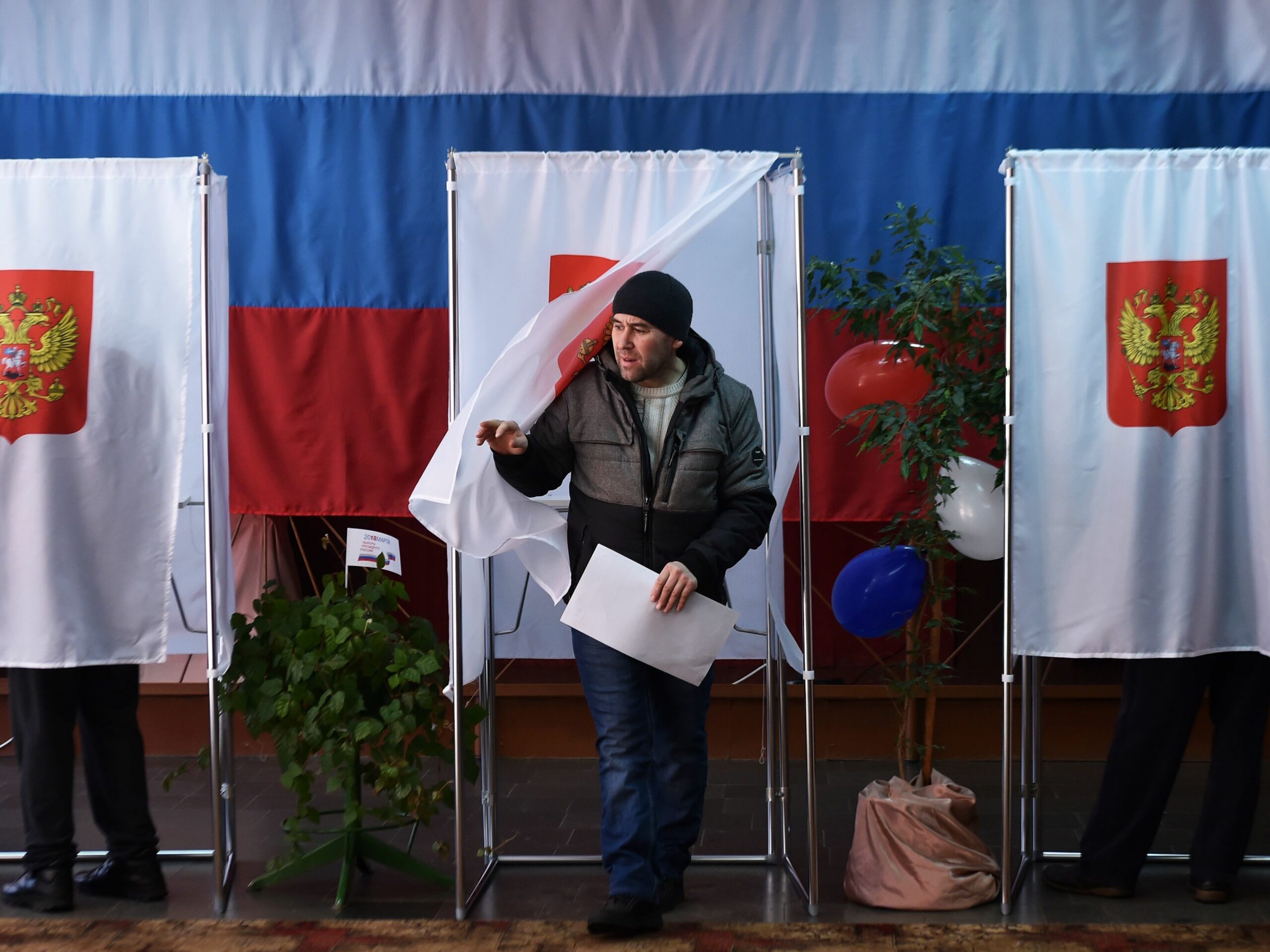
Legislative elections are currently being held in Russia between September 17-19, as 450 new members in the State Duma need to be elected.
The Central Election Commission (CEC) of the Russian Federation decided to open a record number of polling stations in the Transnistrian region – 27 polling stations, in addition to only 3 polling station opened on the right bank of the Dniester in such big cities as Chisinau, Comrat and Balti.
That is the largest number of polling stations opened by the Russian CEC in a foreign country, and five polling stations more than in the 2016 elections. Two of the polling stations were established in Tiraspol, being open from Friday to Sunday. The rest of the Russian polling stations on the Transnistrian territory are opened on Sunday only. The most astonishing fact is that no state other than Russia has ever opened polling stations in the separatist region of the Republic of Moldova. Actually, no polling stations are being opened on the Transnistrian territory when it comes to national elections of the Republic of Moldova either.
Therefore, one could say that the stakes are high when it comes to Transnistrian voters, especially since, most likely, the hopes of Russian authorities are not necessarily based on a large turnout and their real support, rather on the real possibility of electoral fraud on a territory that is not controlled by the constitutional authorities in Chisinau.
Before the presidential elections in 2018, Russian authorities announced that there are 220 thousand Russian citizens living in the Transnistrian region. That time, 24 polling stations were opened in the separatist area. Despite the fact that the Tiraspol Electoral Commission announced that, in the last year and a half alone, the voter turnout has officially fallen in the region by more than 7 700 people, the Russian CEC still decided to establish a record number of polling stations this year, which strengthened the argument about the possibility of election fraud.
Both Tiraspol’s administration and the regional media campaigned for the ruling political party United Russia and called for a high turnout at polling stations. Transnistria’s leader, Vadim Krasnoselski, urged the people on the left bank of the Dniester to come to the polls “because despite all the difficulties, Russia does not forget Transnistria and helps it as much as possible.”
It seems that the campaigning, along with the Russian sponsorship in the region, show great results during every election ballot, as Russian citizens voting in Russian elections in Transnistria are a more active electorate than Moldovan citizens residing in Transnistria and voting in the Moldovan elections at the polling stations arranged on the other bank of the Dniester, especially for them. In the previous Russia’s legislative elections, 56 thousand people voted in Transnistria, while just under 29 thousand inhabitants of the Transnistrian region voted in the recent Moldova’s parliamentary elections.
Before every election ballot held in the Russian Federation, Moldovan authorities make statements, suggesting the Russian side to abstain from opening polling stations in Transnistria, whereas Russian authorities ignore them every time.
This year, the Ministry of Foreign Affairs and European Integration of the Republic of Moldova also sent a note of protest against opening the polling stations in Transnistria. “The Ministry of Foreign Affairs and European Integration regrets that, despite the position consistently expressed by the Moldovan authorities, the Russian side acted in a manner that does not correspond to the principle of sovereignty and territorial integrity of the Republic of Moldova and the bilateral legal framework.”
The Ministry representatives noted that Russian authorities were informed of the lack of impediments to open polling stations in localities under the control of Moldova’s constitutional authorities and requested the Russian side to refrain from opening the 27 polling stations in the localities of the breakaway region, given the impossibility of ensuring the necessary security conditions for the current elections.
Moscow’s Central Election Commission also opened nine polling stations in Abkhazia and ten in South Ossetia – two disputed territories that were internationally recognised by Russia and a few more countries, while considered under military occupation, according to the Georgian Government. These lands, that are under the exclusive control of Russia, offer good opportunities to ‘correct’ any uncomfortable results obtained in the country, where the ruling political party no longer enjoys as much support as it wants to appear.
Photo: wjct.org

























